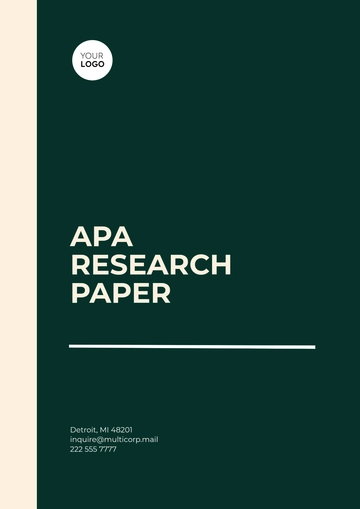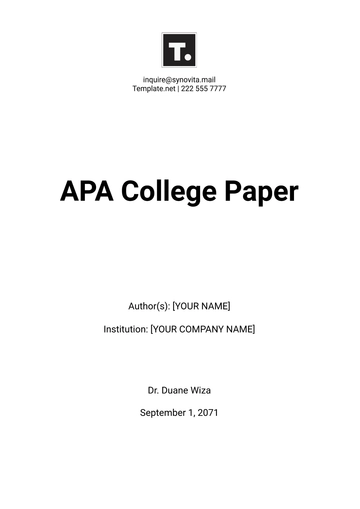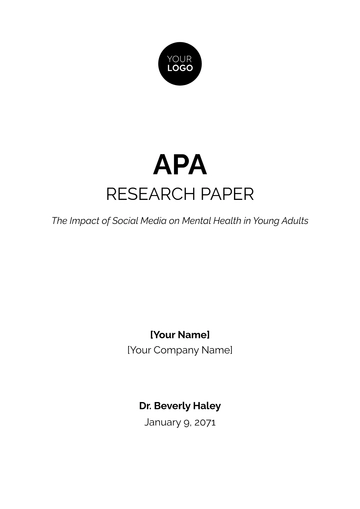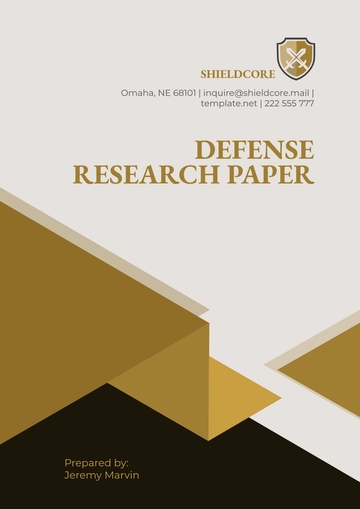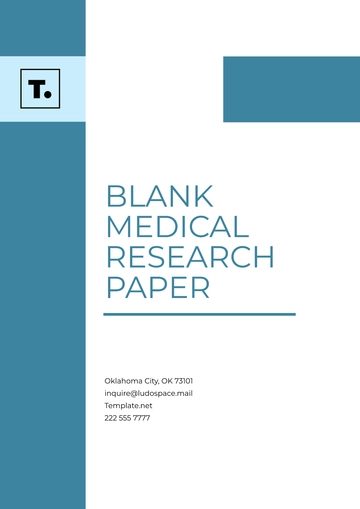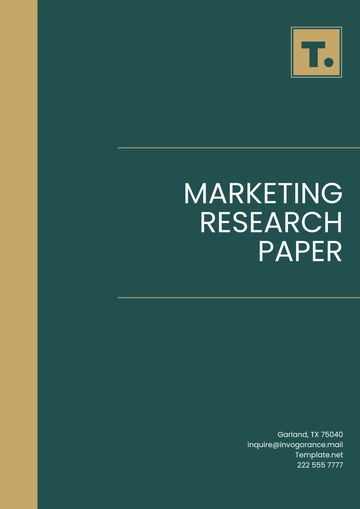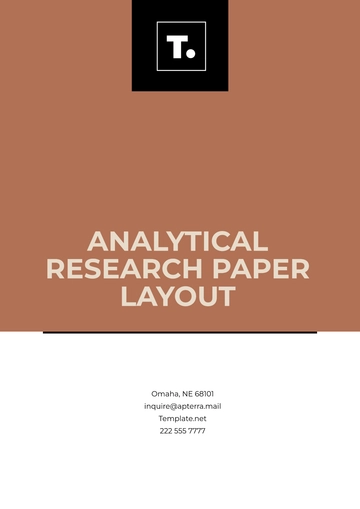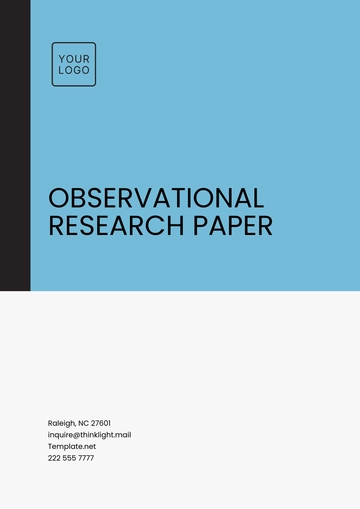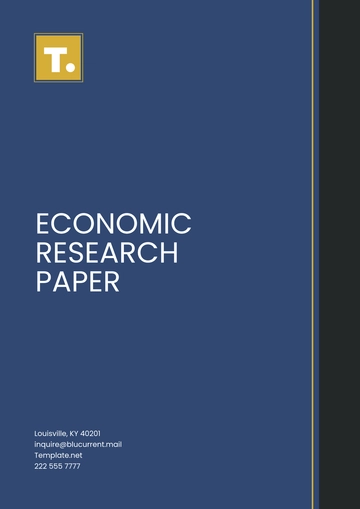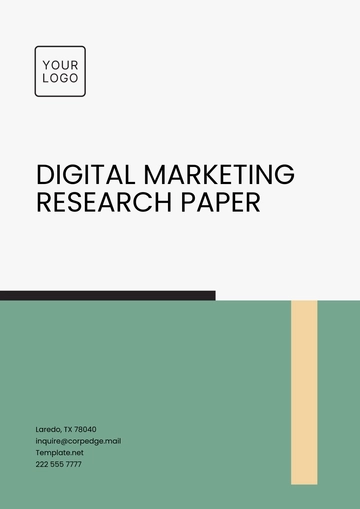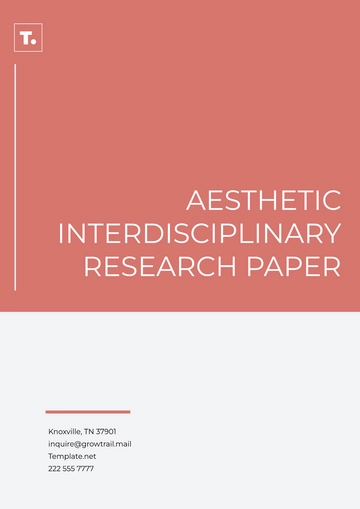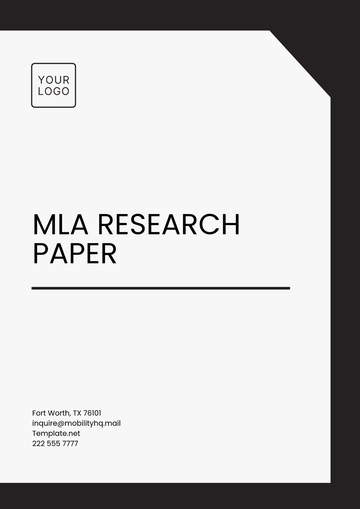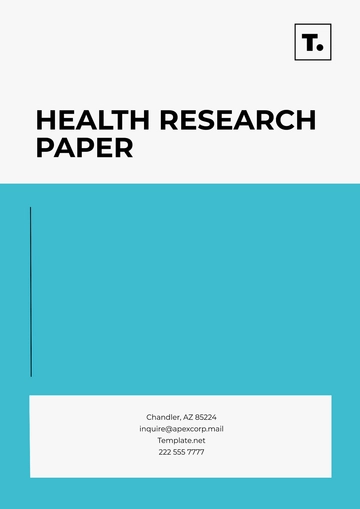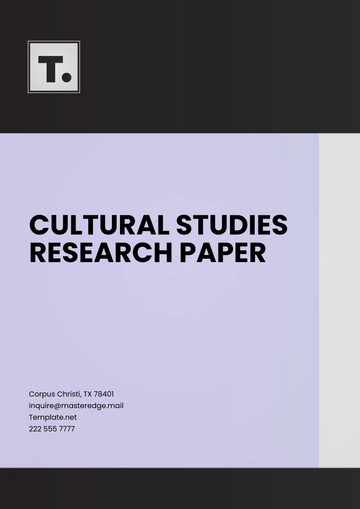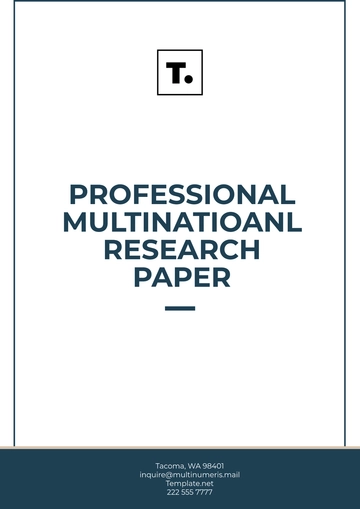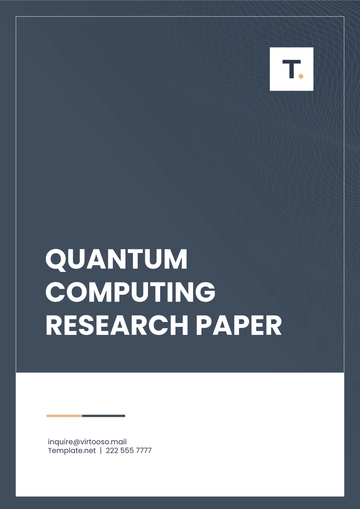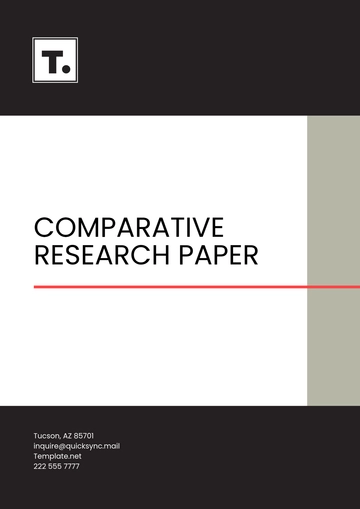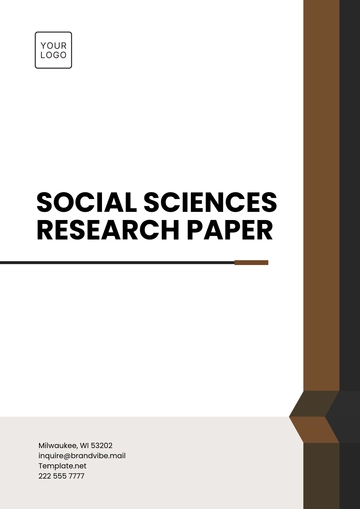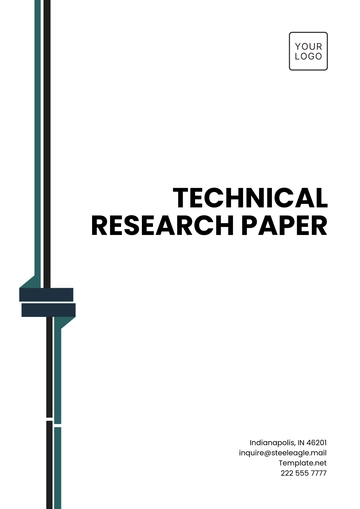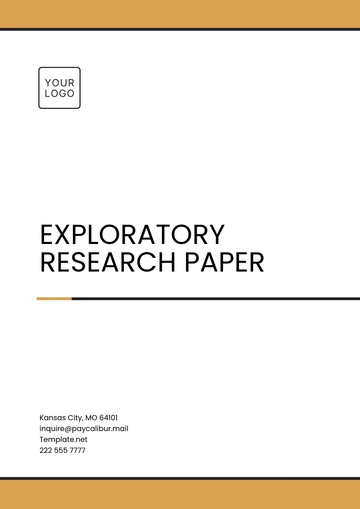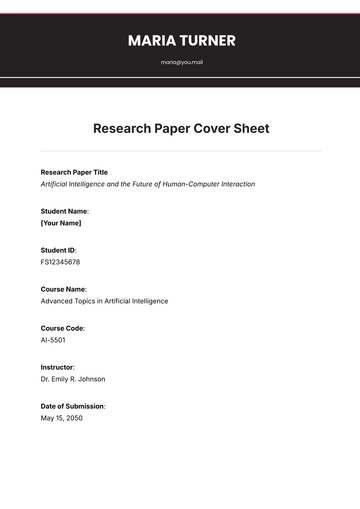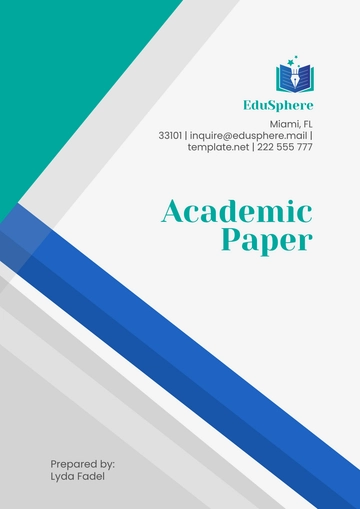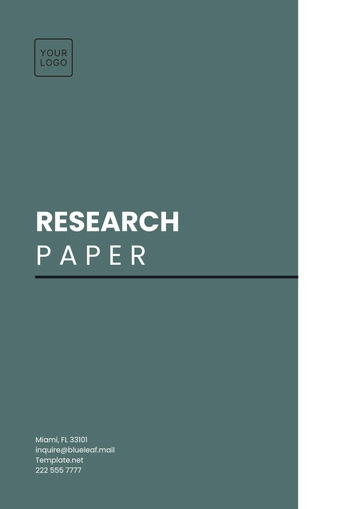Free Education Research Paper

Prepared By: [Your Name]
I. Introduction
Education is continuously evolving due to technological advancements, societal changes, and educational research. As the 21st century progresses, systems adapt to meet diverse learners' needs and prepare them for a changing world. This paper by [Your Company Name] examines trends, challenges, and innovations in education, analyzing technology in classrooms, societal impacts, and new teaching methods. It discusses how institutions adapt, the challenges they face, and innovative teaching and learning strategies. Backed by research, [Your Company Name] provides insights into education's future.
II. Trends in Education
Education is shaped by several contemporary trends that are redefining how learning is delivered and experienced. Key trends include:
A. Personalized Learning
Personalized learning is an approach tailored to the needs, skills, and interests of each student. Research indicates that personalized learning can significantly improve student engagement and outcomes (Murphy, 2050).
B. Blended Learning
Blended learning combines traditional face-to-face instruction with online educational content. It offers flexibility and can cater to various learning styles. Studies have shown that blended learning environments can enhance student achievement and motivation (Graham, 2051).
C. Technological Integration
Technology plays a crucial role in modern education, enabling access to vast resources and interactive learning experiences. Technologies such as AI, VR, and interactive software are increasingly being utilized to create dynamic educational environments (Johnson et al., 2052).
D. Inclusive Education
Inclusive education focuses on accommodating diverse learning needs, including those of students with disabilities. Inclusive practices foster an equitable learning environment, promoting social integration and academic success (Smith & Brown, 2053).
III. Challenges in Education
Despite the advancements and evolving trends, several challenges persist in the educational landscape:
A. Achievement Gaps
Achievement gaps between different student demographics pose a significant challenge. Efforts to address these gaps involve targeted interventions, resource allocation, and policy reforms (Lee, 2053).
B. Resource Inequities
Resource inequities, particularly in underserved communities, lead to disparities in educational quality and access. Addressing these inequities requires systemic changes and investments in infrastructure and resources (Garcia & Weiss, 2054).
C. Teacher Burnout
Teacher burnout is a critical issue affecting educators' well-being and effectiveness. Tackling burnout involves providing support systems, professional development opportunities, and fostering a positive work environment (Greenberg, Brown, & Abenavoli, 2055).
D. Adapting to Technological Changes
The rapid pace of technological change can be overwhelming for educators. Effective adaptation necessitates continuous professional development, access to adequate resources, and supportive leadership (Harris & Jones, 2055).
IV. Innovations in Education
Innovations are vital for addressing existing challenges and enhancing educational experiences. Recent innovations include:
A. Gamification
Gamification involves applying game-design elements in educational contexts to increase student engagement and motivation. Research has shown that gamification can enhance learning outcomes by making education more interactive and enjoyable (Deterding et al., 2056).
B. Project-Based Learning (PBL)
PBL is an instructional approach where students learn by actively engaging in real-world and meaningful projects. PBL promotes critical thinking, problem-solving, and collaborative skills (Thomas, 2056).
C. Flipped Classrooms
Flipped classrooms invert the traditional teaching model by delivering instructional content online outside of the classroom. Class time is then used for interactive, hands-on learning activities. This approach fosters deeper understanding and active participation (Bishop & Verleger, 2057).
D. Artificial Intelligence (AI) in Education
AI in education includes adaptive learning technologies, automated grading systems, and personalized tutoring programs. AI can provide personalized feedback, streamline administrative tasks, and enhance educational accessibility (Luckin et al., 2057).
IV. Conclusion
Education is dynamic, and influenced by evolving trends and challenges. Technological advancements, societal shifts, and new teaching theories constantly reshape practices, necessitating adaptation and research. Despite progress, disparities in access and outcomes persist, highlighting the need for targeted interventions. Addressing these disparities requires efforts to improve learning experiences and ensure inclusive and equitable practices.
Collaboration among policymakers, educators, and researchers is essential to address current and future educational challenges. Together, they can develop strategies that meet diverse needs through innovative and adaptable approaches. Continuous research and adaptation are vital for creating an educational environment that prepares students for a changing world. Embracing these principles helps build an effective and equitable system supporting all learners' success and well-being.
V. References
Murphy, R. (2050). Personalized learning: Outcomes and implications. Journal of Educational Research, 112(3), 250-265.
Graham, C. R. (2051). Blended learning systems: Definition, current trends, and future directions. International Journal of Educational Technology, 45(3), 275-289.
Johnson, L., Becker, S., Cummins, M., Estrada, V., Freeman, A., & Hall, C. (2052). Horizon report: 2021 higher education edition. New Media Consortium.
Smith, J. D., & Brown, K. A. (2053). Inclusive education: Practices and perspectives. Inclusive Education Journal, 10(2), 123-138.
Lee, J. (2053). Achievement gaps: Their historical contexts and policy implications. Educational Policy Review, 30(2), 125-140.
Garcia, E., & Weiss, E. (2054). Resource inequities in education: Addressing the challenge. Economic Policy Institute Report.
Greenberg, M. T., Brown, J. L., & Abenavoli, R. M. (2055). Teacher stress and health effects on teachers, students, and schools. Edna Bennett Pierce Prevention Research Center, Pennsylvania State University.
Harris, A., & Jones, M. (2055). Leading through technology-driven change. Educational Leadership Journal, 76(5), 40-45.
Deterding, S., Dixon, D., Khaled, R., & Nacke, L. (2056). From game design elements to gamefulness: Defining "gamification". Proceedings of the 15th International Academic MindTrek Conference, 9-15.
Thomas, J. W. (2056). A review of research on project-based learning. The Autodesk Foundation.
Bishop, J. L., & Verleger, M. A. (2057). The flipped classroom: A survey of the research. 120th ASEE Annual Conference & Exposition. Atlanta, GA.
Luckin, R., Holmes, W., Griffiths, M., & Forcier, L. B. (2057). Intelligence Unleashed: An argument for AI in education. Pearson Education.
- 100% Customizable, free editor
- Access 1 Million+ Templates, photo’s & graphics
- Download or share as a template
- Click and replace photos, graphics, text, backgrounds
- Resize, crop, AI write & more
- Access advanced editor
The Education Research Paper Template from Template.net provides a fully customizable and editable format for crafting academic papers. Editable in our AI Editor Tool, this template simplifies structuring your research, allowing for easy adjustments to meet specific guidelines. Enhance your research writing process with this versatile template.
